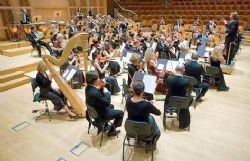|
Symphony
FROM THE NEW WORLD TO THE OLD WORLD
by Peter Lert
Saturday, June 14, 2025
Chamber
MC2 DUO RECITAL CLOSES 222'S SEASON
by Terry McNeill
Saturday, June 14, 2025
Choral and Vocal
CANTIAMO SONOMA'S LUSCIOUS A CAPELLA SINGING IN SEASON ENDING CONCERT
by Pamela Hicks Gailey
Sunday, June 8, 2025
Symphony
SRS SEASON ENDS WITH RESOUNDING TA-TA-TA-BANG
by Terry McNeill
Sunday, June 1, 2025
Symphony
YOUTHFUL VIRTUOSITY ON DISPLAY AT USO'S MAY CONCERTS
by Peter Lert
Saturday, May 17, 2025
Symphony
MYSTICAL PLANETS AND LIVELY GERSHWIN ORTIZ AT FINAL SRS CONCERT
by Peter Lert
Sunday, May 4, 2025
Symphony
VSO'S CONCERT MUSIC OF TIME, MUSIC OF PLACE
by Peter Lert
Sunday, April 27, 2025
VOCAL ELEGANCE AND FIRE AT THE 222'S RECITAL APRIL 26
by Pamela Hicks Gailey
Saturday, April 26, 2025
CANTIAMO SONOMA SINGS AN INSPIRED GOOD FRIDAY MOZART REQUIEM CONCERT
by Pamela Hicks Gailey
Friday, April 18, 2025
DRAMATIC SHOSTAKOVICH SYMPHONY CLOSES PHILHARMONIC'S 25TH SEASON
by Terry McNeill
Sunday, April 13, 2025
|
 |
 Polish Baltic Philharmonic Orchestra |
BEETHOVEN'S SYMPHONIC DRAMA PERVADES POLISH ORCHESTRA'S MARIN CONCERT
by Terry McNeill
Saturday, March 12, 2016
European orchestras on an American tour face a pesky single concert program decision – popular or provocative repertoire? The Polish Baltic Philharmonic landed squarely March 12 on the first option, a conventional all-Beethoven afternoon.
A Marin Center audience of 900 in San Rafael heard the 55 musicians from Warsaw in the concert’s opening Egmont Overture, Op. 84. It was a performance that caught the somber drama of the nine-minute work, and drama was the operative word for the entire concert. Acoustics in the fan-shaped hall always sound to me direct and with minimal reverberation, and strong upper string power in the Egmont often covered cellos and basses.
Conductor Boguslaw David moved the Overture briskly, and that tempo continued with the E-Flat Piano Concerto, Op. 73, that closed the first half. Marcin Koziak gave an impressive but mostly routine reading of the solo part. Performances of the “Emperor” Concerto seem to fall between the architectural and fastidious, and the heroic and heaven storming. My interest has always centered on the latter, and Mr. Koziak’s view this day stressed the symmetry and cohesive aspects of the score and left sonorous voice leading and pianistic energy alone. Heavens were never approached.
In the Allegro the music proceeded in an animated manner with Mr. Marzin playing half-pedaled runs, fast trills, several intriguing inner voices and the less than ferocious 12 big repeated chords mid way. Duos with oboe and bassoon were lovely, and the horn volume was assured. The short cadenza with bright three-note trills led into a fast-paced long coda where horn color was foremost and dramatic impact was robust.
Mr. David moved along the spiritual Adagio in many long descending phrases that on balance needed more relaxation between cantabile and the many short crescendo sections.
The same approach continued in the finale, the pianist sticking to the score (no leaning on ritards or left-hand octave doublings) and the conductor staying safe with a stable tempo and smooth orchestra textures. It was a well-rehearsed and convincing “Emperor” that had a taste of the prosaic.
Histrionics are part of the monumental C Minor Symphony (Fifth), and Mr. David drew from his Orchestra a performance that was both muscular and impeccably played. Conducting from score as he did throughout, Mr. David’ s driving interpretation highlighted the compressed themes and sharply etched groups of the three famous quick notes and the one that is louder, longer and lower in pitch. The character here was urgent and violent. Though never really quiet, the second movement’s best moments were with the interplay of soft, long-held notes from the oboe, flute, clarinet and bassoon. Sitting stage right, the cellos finally were heard with their inherent richness. The conductor’s control of dynamics was deft and always careful.
In the final two Allegro movements, especially the last one, the march-like rhythms held sway and the many false cadences demonstrated the composer’s genius of extravagant symphonic power and mastery.
Mr. David is not a flamboyant conductor in physical podium movement, but he kept the boisterous finale away from raged attacks and releases, and thus the impact on the audience was predictable but no less potent.
A rainy afternoon moved some in the spacious hall toward a quick exit, but the conductor commandeered a stage microphone and in flawless English spoke about the Polish’s 42-concert US tour and the delight his ensemble was having with making music in so many venues. An encore followed, a minor key Dvorak waltz that was over too quickly.
Mr. David coquettishly said from the stage that there would be one more, and that it would be familiar. And it was, a raucous performance of Souza’s Stars and Stripes Forever that generated an additional standing ovation.
|
